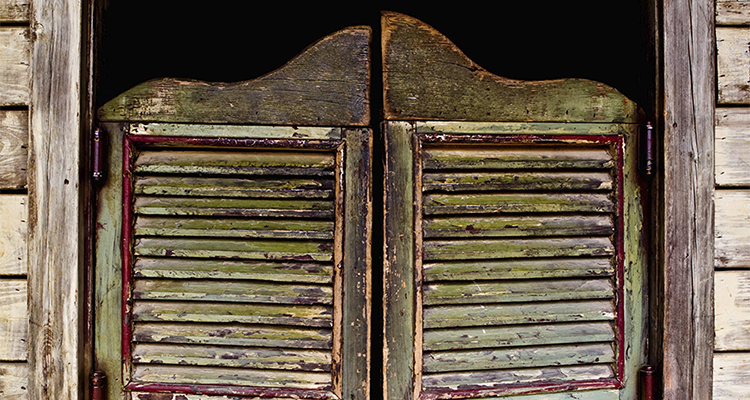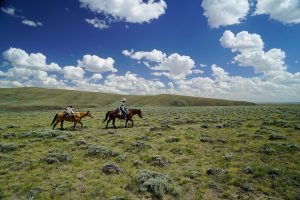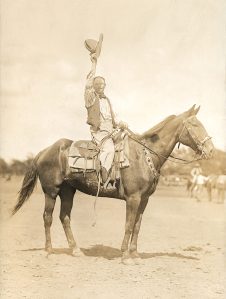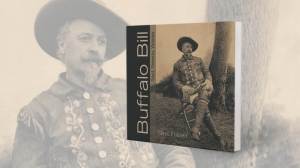
‘The wrestling match had turned into a desperate fight for the weapon. But two hands on a gun trump one hand every time’
“Two men walk into a saloon…”
No, not the opening of a bad joke but the beginning of a fatal confrontation that ended with one man lying dead on the floor, the other charged with murder. It is no joke that more men fell to gunfire in saloons than on all the Main Streets in all the towns in the West. Saloons were places to drink, gamble, kill or be killed. All the necessary ingredients were present in Fort Worth, Texas, in May 1899—a couple of sporting men, gambling protocol, a long-simmering feud, alcohol, hot words and a confrontation. The instigator was ornery and highly excitable gambling house manager Frank Fossett, though the victim, former Fossett employee Doc Carver, was no innocent. Another Western truism: Men nicknamed “Doc” were more likely to be cardsharps than practicing physicians.
Fossett was born Henry Frank Fossett on March 5, 1863, in Meridian, Texas, the Bosque County seat. As in so many Texas communities, ranching was the principal activity in Meridian, and the biggest landowner was the most important person in town. The Fossett family was the most distinguished in Bosque County. Frank’s father, Henry, was a lawyer and county judge, his uncle, Captain Sam Fossett, a Civil War hero who after the war became county sheriff. At the time Frank’s father died, the Fossetts owned half of Bosque County.
In their youth, however, the three Fossett brothers weren’t much interested in hard work or public service; they much preferred drinking and throwing dice. Frank had several run-ins with the law, including the theft of a yearling calf from a farmer at age 13. He graduated to carrying a gun within the town limits and then murder, his victim a black man whom Frank had accused of making untoward “comments” to his young wife. Among his milder crimes was “disturbing religious worship” on Sunday, which cost him $25 plus costs.
As the Fossetts practically owned Meridian, the boys never got more than a slap on the wrist. A grainy, Reconstruction-era photograph shows the brothers standing in front of Old Fossett Hall, which housed the Bosque Eagle and a second-floor public room. Had Meridian been Virginia City, the brothers would have been named Cartwright, although the fictional Adam, Hoss and Little Joe were paragons of virtue by comparison. Sure, the Cartwright brothers got in their share of Hollywood-style saloon scrapes, but they kept coming back week after week to do more good than bad.
Still a teenager, Frank married 14-year-old Gussie in 1881 or ’82, and she became pregnant within a year. Mother and son died of complications from childbirth in January 1884, taking away the only source of stability in Frank’s life. Later that year he married Helen Thompson, ex-wife of a county judge, who already had a daughter. Together they had two more children, Ada and William. But Meridian was too small for Frank, despite its curbed Main Street and substantial stone buildings. He and Helen soon kicked the dust off their heels and moved to Fort Worth, gateway to west Texas.
Frank was a variation on the prodigal son, who, according to the Gospel of Luke, “took his journey into a far country, and there wasted his substance with riotous living.” The difference was, Frank traveled only as far as the nearest big city and took his family with him. He showed little regard for the law or other men. Though not physically imposing, he was quick to take offense and unafraid to mix it up. Fossett carried a six-shooter, a tool of the trade for a professional gambler—and he knew how to use it.
Gambling was Frank Fossett’s calling—easier than raising cattle and more lucrative than any other line of work for which he was qualified. In Fort Worth he found practically limitless opportunities for a cardsharp. There was no dearth of saloons or of suckers begging to be relieved of their bankrolls. Fossett discovered what the likes of Wyatt Earp, Bat Masterson and Luke Short had discovered a decade earlier: Fort Worth deserved its place on the gamblers’ circuit. Lowbrow gents did their drinking and gambling in the Hell’s Half Acre district on the south end of town. The fancy saloons lined Main Street on the north, or courthouse, end of town, including the Board of Trade at 316 Main, the Cabinet Saloon at 400 Main, the Palais Royal at 406 Main and the White Elephant, which dominated the 600 block. As a bow to propriety, each placed a screen just inside the batwing doors to block the view from more genteel passersby.
The real action took place upstairs, where second-story gambling rooms catered to highbrow clientele. The Palais Royal and White Elephant gamely competed for the title of Fort Worth’s premier saloon. The former had been a local fixture since 1888, when Jake Johnson and Victor Foster opened it a block down from the White Elephant. There was nothing proletarian about the Palais Royal, which boasted a carved, antique oak bar with a marble base, a tiled floor and wine rooms in the back for the ladies. Its second-floor operation was reputedly Texas’ most palatial gambling room. It was here Luke Short set up headquarters after selling his interest in the White Elephant in 1887. Short died in 1893, and now, six years later, Fossett oversaw the nightly keno, faro and poker games.
One of Fossett’s employees was Green Durrett, known professionally as “Doc Carver.” He hailed from Georgia, home state of that other gambler nicknamed “Doc,” who had likewise come to Texas before becoming a legend in Kansas and Arizona. Carver had the telltale pasty complexion of a man who spent his nights gambling and his days sleeping. Doc had logged a string of convictions across Texas for disturbing the peace at gaming houses, losing the middle finger on his right hand during one such scrape. Like many gamblers he carried a hideaway gun, though there is no record he ever used it. And like most gamblers, when the law started breathing down his neck, he skipped town, always landing in another town where the law was more tolerant of his sort.
That’s how Carver came to Fort Worth around 1895, finding employment as a dealer at the Palais Royal. He had no trouble getting hired, as he had known Fossett professionally for about 15 years. In his early 40s, Carver was a bachelor who carried all he owned in a carpetbag. In Fort Worth he boarded a few years with Frank and Helen Fossett at their house on West First Street before moving down the street in October 1898 to a room at Mrs. Sallie Nichols’ boarding house.
Things were rocking along smoothly until one Monday in May 1899 when Fossett fired Carver for reasons that remain murky. It may have been due to Carver’s recent fight with a customer, which left him with a permanently crippled wrist (“bent like a finger”). A dealer with a crippled wrist was not much use, so this was probably the reason Fossett dismissed him. Carver believed he had been badly treated, but instead of leaving Fort Worth, he stayed around, trying to catch on at another saloon. None would have him. Growing more bitter by the day, he told anyone who would listen that Fossett ran a “crooked house.” That sort of accusation could ruin a gambler’s business. And Carver didn’t stop there; he started scurrilous rumors about Helen and her teenage daughter. On Monday afternoon, May 29, a mutual acquaintance of both men informed Fossett that his former dealer was spouting threats and speaking “disrespectfully” of Fossett’s wife and stepdaughter. In later court testimony it was delicately stated that Carver had accused them of “bad character.” The actual words he used were more pungent.
Fort Worth was not so big the two men could avoid each other indefinitely, and they happened to cross paths right in front of the Palais Royal. It was about 5 p.m., and Carver had just left the Cabinet Saloon. Only a few steps brought him to the Palais Royal. It surprised both men when they came face to face. Fossett had earlier run into some friends outside the saloon and joined them inside for drinks. They were just re-emerging when Carver showed up. The latter started to brush past Fossett and enter the saloon, but the Fossett party blocked the doorway. Doc could not get past them but did not want to walk away and concede the sidewalk to his enemy. He stood there a moment in awkward silence and then, pointedly ignoring Fossett, jokingly asked Warren Jeffries where he had bought his ugly pants. Jeffries tried to reply, but Fossett interrupted him, demanding to know what Carver had been saying “about me and my house.” Responded Carver, “Any damn thing I please.”
That was all it took. Fossett was standing on the saloon’s front step, which put him about six inches higher than Doc. Fossett later testified matter-of-factly that had he had a shotgun at that moment, he would have killed Carver where he stood. He did have a pistol under his coat, but instead of reaching for it, he kicked Carver squarely in the privates. (The newspapers would report it as “the stomach.”) Carver doubled over. Then, like an enraged bull, he charged forward and got a hand around his enemy’s neck. Fossett now grabbed Carver, and they struggled for a moment before crashing through the swinging doors.
There was no lack of witnesses to the fight. Fossett’s pals Bill Nabors and Warren Jeffries were standing beside him when it started but, expecting gunplay, decided to vamoose. Electrician Lee Stephens had a ringside seat. He was putting up lights over the entrance at the time, giving him an elevated view. Billie Morrison, owner of the restaurant across the street, was sitting at the front table by the window. Once the fight moved inside the Palais Royal, Dolphus Hill, a porter working behind the bar, witnessed everything.
Hill watched as the two crashed into the cigar stand just inside the doorway and then, still locked together, stumbled around behind the partition screen. Each man was holding on with one hand and whaling away with the other, neither doing much damage. They pushed and shoved like a couple of bull moose in rutting season as the wrestling match moved toward the bar. At around 180 pounds, Carver outweighed his opponent by at least 10 pounds and, at 6 feet, was also taller, but Fossett was seven or eight years younger and described as a “wiry, active man.” Although Carver’s crippled wrist put him at a disadvantage, he finally managed to get Fossett around the neck and put a headlock on him. Twisting free, Fossett reached under his coat. When he turned back around, he was gripping a .45 in both hands. Carver had the presence of mind to grab the gun and pull it down with one hand while continuing to flail away with the other. The wrestling match had turned into a desperate fight for the weapon. But two hands on a gun trump one hand every time, and Fossett still had his finger on the trigger.
A shot rang out. Carver stumbled backward and fell to the floor, a bullet in his lower right leg. He twisted to the right and tried to get up, but Fossett stepped in close and shot him again, through the left shoulder. Doc was still game, so Fossett aimed dead center and put a third bullet into him. Carver remained defiant. Sprawled on the rubber mat in front of the bar, he fixed his gaze on Fossett and spat out, “You damned cur, you knew I had no gun, and you came to match a fight with me.” Then he looked over to the porter behind the bar and pleaded, “Save me.”
With three unfired rounds in the chamber of his six-shooter, Fossett backed out of the saloon, keeping Carver covered in case there was any fight left in him. Two of his pals had entered the saloon after the shooting stopped. They heard him say something to the dying man but later could not agree on what it was. One heard Fossett say, “You have been trying to match a fight with me for some time, and now you’ve gotten one.” The other swore Fossett said, “You were hunting it, and now you have got it.” Whatever was said, the victim was beyond hearing it. Carver was a bloody mess, slipping into a coma.
Back outside, Fossett lowered his six-shooter and calmly plopped down in the bootblack’s chair near the entrance. He handed the gun to a friend and just sat there, waiting for the police. An officer arrived within five minutes, took possession of the intended murder weapon and placed Fossett under arrest. He did not put his prisoner in handcuffs but took him straight to Justice of the Peace R.F. Milam in the courthouse four blocks away.
By now a crowd had gathered in front of the saloon. Some of the men ventured inside, where the shaking porter still stood behind the bar, and Carver’s body lay on the floor. Remarkably, he was still breathing. When they opened his shirt for a better look at his wounds, the damage done by .45 slugs at close range became apparent: One bullet had shattered his left shoulder, passed through both lungs and exited the right side; the bullet to the lower abdomen had also passed clear through, leaving a trail of blood and bile. Either of the two wounds was fatal. They searched his clothes but found no weapon, setting the stage for a contentious trial.
Small-town justice had its own rules and protocols. When the situation demanded, it could be very speedy. Justice Milam convened an immediate coroner’s inquest and ordered all available witnesses to attend. He took testimony until 8 p.m. and then adjourned until the next morning at 9. Fossett spent the night in county lockup and was back in court the next two days as Milam segued the inquest into a hearing on Fossett’s request for bail. Bail was denied, and on June 1 the grand jury handed up an indictment for second-degree murder. The case was set for trial on June 12 before Judge William D. Harris of Texas’ 17th Judicial District. The sheriff summoned some 200 men for a jury pool while the judge heard arguments on a writ of habeas corpus to grant bail on the indictment. Fossett got his first break when Harris granted bail. The defendant posted the $6,000 bond, thus avoiding a long stretch behind bars while his case was decided. Now he would be able to sleep in his own bed, eat home-cooked meals and attend court in his Sunday best.
Doc Carver was buried at 10 a.m. on May 31 in what was described as a “North Side cemetery.” Attempts to reach his family in Alabama and Georgia had proved fruitless, so a small group of Fort Worth friends made all the arrangements. Conducting the graveside service was the Reverend J.B. Buchanan, who didn’t even know the deceased.
Fossett’s trial lasted five days. A parade of sporting men, lawyers and lawmen took the stand. Only a few character witnesses testified for the deceased, one of them his landlady. But many witnesses testified on the defendant’s behalf, providing a fascinating window into the gambling underworld. One of them, Sebe Maddox, was from Fort Worth’s most respected family of lawmen. The defendant also took the stand, admitting coolly he had intended to kill Carver one way or another, thus nullifying any self-defense plea.
State v. Frank Fossett went to the jury at 5 p.m. on June 16—exactly 18 days after the killing. At noon the next day the jury returned its verdict, finding Fossett “guilty of murder of [sic] the second degree.” He was sentenced to 20 years in the penitentiary. Fossett’s lawyers covered all the bases, filing a motion for a new trial and also appealing the verdict directly to the state Court of Criminal Appeals. Judge Harris denied the motion, but in November the three-member appeals court reversed the verdict and ordered a retrial. In May 1900 Fossett was back in a Fort Worth courtroom, this time before Judge Irby Dunklin, who had replaced Harris on the bench of the 17th District Court. Defense counsel’s first move was to request a change of venue, charging that “a fair and impartial trial cannot be had in Tarrant County.” The judge denied their petition, and the second trial went forward.
The state was again seeking a conviction for second-degree murder. (No one had accused Fossett of gunning for Carver, which would have made it first-degree.) This time the attorneys examined some 150 witnesses, whose testimony stretched over seven days—an unusually long trial in Tarrant County at the time. Again the jury brought back a verdict of guilty, assessing Fossett the same 20-year sentence as before. His lawyers immediately announced their intention to seek a retrial, on what grounds no one could remember later, as things soon took a turn for the bizarre.
Sometime during the proceedings Frank Fossett had quietly slipped out of the courtroom. No one noticed the defendant had disappeared until it was too late. He had sat quietly at the defense table through two trials. Free on bond, he could come and go as he pleased, so it was “some time” before anyone noticed he had jumped bail. Apparently, he had walked straight out of town on Seventh Street, flagging down a boy on a wagon and paying him $2 for a lift to Benbrook, 10 miles southwest of town. There the fugitive caught a westbound Texas & Pacific train, and that was the last anyone ever saw of him. Newspapers called it “the sensation of the time” and “probably the most remarkable escape ever made from Fort Worth by a prisoner,” conveniently forgetting Jim Courtright’s daring escape from the custody of police and a pair of Texas Rangers in 1884.
A search of the fugitive’s usual haunts turned up nothing. Embarrassed, Sheriff Sterling P. Clark wired law enforcement agencies statewide to be on the lookout for Fossett, offering a reward for his capture. Some of the other agencies added to the fund. In coming months witnesses variously placed Fossett in El Paso, New Orleans, Mexico, Cuba, even South Africa. According to family lore he went to Alaska, losing himself among the Klondike goldfields, never to return to Fort Worth. Frank had abandoned his wife and children, leaving Helen Fossett a widow just as surely as if Doc Carver had murdered her husband instead of vice versa.
In the midst of the manhunt the case took another strange turn when Meridian officials withdrew their reward offer, telling the Tarrant County sheriff their participation had been secured by a “misapprehension of the facts.” Fossett, they insisted, was not the cold-blooded killer duplicitous Tarrant County authorities would have folks believe. It’s a safe bet the prominent Fossett family was behind the change of heart. Should Frank show up in Meridian, officials there would not arrest him and return him to Fort Worth.
Fossett’s flight from prosecution went down in the books as one of the great unsolved mysteries of Fort Worth law enforcement. The Tarrant County DA’s office would only say they had “pigeonholed” the case, meaning they had given up on ever bringing Fossett to justice. Cynics suggested the case died of neglect, as the victim had no moneyed friends to offer a fat reward or to foot the expense of sending officers gallivanting across the Western states chasing down leads.
In the end, the Fossett-Carver affair was about justice in a small town not too far removed from its frontier roots. And it was about the Western gambling culture, where honor took strange forms and six-guns were the court of highest appeal. One of the gamblers who testified at Fossett’s first trial was one-armed Bill Thomason, another member of the local gambling fraternity. Eight years later when Tarrant County authorities tried to close his gambling operation above the Stag Saloon, Thomason would shoot County Attorney Jefferson Davis McLean to death in broad daylight on Main Street (yes, sometimes shootings really did happen outside the saloons). It was a shocking reminder that while it might be a new century, Fort Worth remained wild and woolly.
Richard Selcer writes often about saloons, shootings and Fort Worth. For further reading try his books Fort Worth Characters, Hell’s Half Acre: The Life and Legend of a Red-Light District and Legendary Watering Holes: The Saloons That Made Texas Famous. Tonya Fossett of Clifton, Texas, has deep roots in Lone Star State history.





